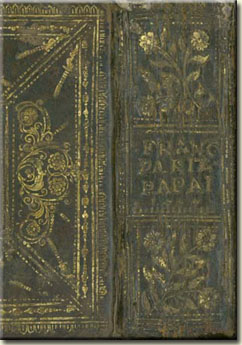|
One of the gems of
the Library of the Hungarian Academy of Sciences is the Album
Amicorum of Ferenc Pápai Páriz, Jr., which he carried with
himself on his one and half decades of European peregrination
(1711 – 1726). This album amicorum, the use of which
followed a widespread European practice of the age, is now made
available for all the researchers of the period, and all the
curious who want to see this relic of the past with their own
eyes. Its content opens a special window on the intellectual
life of eighteenth-century Europe.
The 122 pages of the Album preserve autograph mementos written
in Arabic, English, French, German, Greek, Hebrew, Italian,
Latin, Spanish or Syriac – and in many cases in more than one
language – signed by English, Danish, Dutch, French, German,
Hungarian, Polish and Swiss personalities: bishops, professors
and
physicians, as well as several students who became celebrities
of the next generation. The mementos are regularly composed of a
quotation, a motto and a recommendation, followed by a
signature. Our digital edition was structured in such a way as to offer
the consultation of these notes by names, places or dates, or
by browsing through the original album page by page.
The presentation of the material is complemented by the
biographies of the persons who made their notes in the album,
with frontispieces of the important works, maps and portraits,
in order to offer the best information available to the readers.
These pages revivify the diversity and complexity of Europe, and
perhaps also the dream of a unity based at the same time on the
acknowledgement of differences, and the existence of common roots,
as conceived already by the first humanists. |
| |

|
|
Here you can turn over
the pages of the Album,
read the memento left by Isaac
Newton, or the moving
farewell by Ferenc Pápai Páriz Sen. to his son leaving home.
(The links open in a new window connected to the server of the
Hungarian Academy of Sciences.) |
|
The physician Ferenc Pápai Páriz, Jr.
was born in Transylvania (Nagyenyed / Ajud) on May 1, 1687. His father, Ferenc Sen. was court physician
of the Prince of Translyvania, and acquired international reputation
in his profession. Apart of various medical treatises, he was the
author of the most popular Latin-Hungarian dictionary.
Ferenc at the age of ten was sent to Nagyszeben (Sibiu) to learn
German, and then studied in the College of his native town
Nagyenyed, which had a high reputation as the Eastern European
center of studies for Protestants. In 1711, according to the custom
of the period, he set out on a peregrination of fifteen years to
various academies of Protestant Europe, studying medicine,
philosophy and theology. This journey was carefully planned and
prepared by his father, who had good contacts and friendly relations
with several eminent intellectuals of the period. All of them
offered warm welcome to his heir.
Ferenc graduated in medicine in Halle in 1714. He continued his
studies in Leiden, where he also accomplished works for other
students of Nagyenyed. After a period of matriculation in Franker,
from 1718 until 1726 he studied in England. This period was only
broken by a short trip to Switzerland and the Netherlands in 1719.
In 1726 he returned to Transylvania.
Apart from studies, a secret mission of Ferenc Páriz Pápai was to
collect funds from Protestant princes and institutions for the
reconstruction of the College of Nagyenyed, which had been destroyed
twice – in 1704 and 1707 – by Austrian troops. In fact, he
collected about 7,000 pounds in ten years, a part of which, deposited
in English banks, served as late as 1850 to support the students of
the College of Nagyenyed in their studies abroad.
Availing himself of his studies in the most various intellectual centers of
Europe, his contacts with the most eminent spirits of his period,
and especially his secret diplomatic mission, Pápai managed to
collect an extraordinary series of dedicatory notes in his album
amicorum, among which names like Newton or Halley. Thus the
Album is a unique archive of autographs from the personalities
of the period |